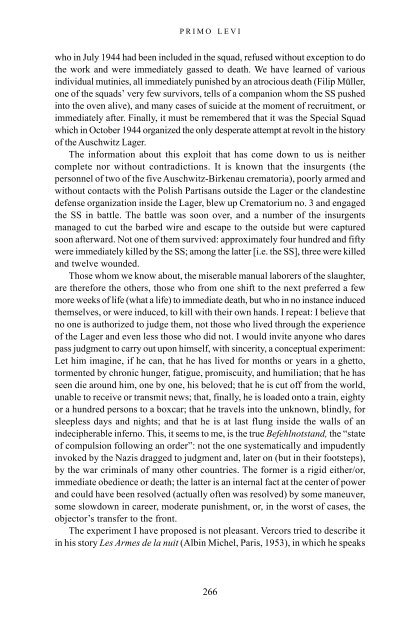The_Holokaust_-_origins,_implementation,_aftermath
The_Holokaust_-_origins,_implementation,_aftermath
The_Holokaust_-_origins,_implementation,_aftermath
You also want an ePaper? Increase the reach of your titles
YUMPU automatically turns print PDFs into web optimized ePapers that Google loves.
PRIMO LEVI<br />
who in July 1944 had been included in the squad, refused without exception to do<br />
the work and were immediately gassed to death. We have learned of various<br />
individual mutinies, all immediately punished by an atrocious death (Filip Müller,<br />
one of the squads’ very few survivors, tells of a companion whom the SS pushed<br />
into the oven alive), and many cases of suicide at the moment of recruitment, or<br />
immediately after. Finally, it must be remembered that it was the Special Squad<br />
which in October 1944 organized the only desperate attempt at revolt in the history<br />
of the Auschwitz Lager.<br />
<strong>The</strong> information about this exploit that has come down to us is neither<br />
complete nor without contradictions. It is known that the insurgents (the<br />
personnel of two of the five Auschwitz-Birkenau crematoria), poorly armed and<br />
without contacts with the Polish Partisans outside the Lager or the clandestine<br />
defense organization inside the Lager, blew up Crematorium no. 3 and engaged<br />
the SS in battle. <strong>The</strong> battle was soon over, and a number of the insurgents<br />
managed to cut the barbed wire and escape to the outside but were captured<br />
soon afterward. Not one of them survived: approximately four hundred and fifty<br />
were immediately killed by the SS; among the latter [i.e. the SS], three were killed<br />
and twelve wounded.<br />
Those whom we know about, the miserable manual laborers of the slaughter,<br />
are therefore the others, those who from one shift to the next preferred a few<br />
more weeks of life (what a life) to immediate death, but who in no instance induced<br />
themselves, or were induced, to kill with their own hands. I repeat: I believe that<br />
no one is authorized to judge them, not those who lived through the experience<br />
of the Lager and even less those who did not. I would invite anyone who dares<br />
pass judgment to carry out upon himself, with sincerity, a conceptual experiment:<br />
Let him imagine, if he can, that he has lived for months or years in a ghetto,<br />
tormented by chronic hunger, fatigue, promiscuity, and humiliation; that he has<br />
seen die around him, one by one, his beloved; that he is cut off from the world,<br />
unable to receive or transmit news; that, finally, he is loaded onto a train, eighty<br />
or a hundred persons to a boxcar; that he travels into the unknown, blindly, for<br />
sleepless days and nights; and that he is at last flung inside the walls of an<br />
indecipherable inferno. This, it seems to me, is the true Befehlnotstand, the “state<br />
of compulsion following an order”: not the one systematically and impudently<br />
invoked by the Nazis dragged to judgment and, later on (but in their footsteps),<br />
by the war criminals of many other countries. <strong>The</strong> former is a rigid either/or,<br />
immediate obedience or death; the latter is an internal fact at the center of power<br />
and could have been resolved (actually often was resolved) by some maneuver,<br />
some slowdown in career, moderate punishment, or, in the worst of cases, the<br />
objector’s transfer to the front.<br />
<strong>The</strong> experiment I have proposed is not pleasant. Vercors tried to describe it<br />
in his story Les Armes de la nuit (Albin Michel, Paris, 1953), in which he speaks<br />
266



